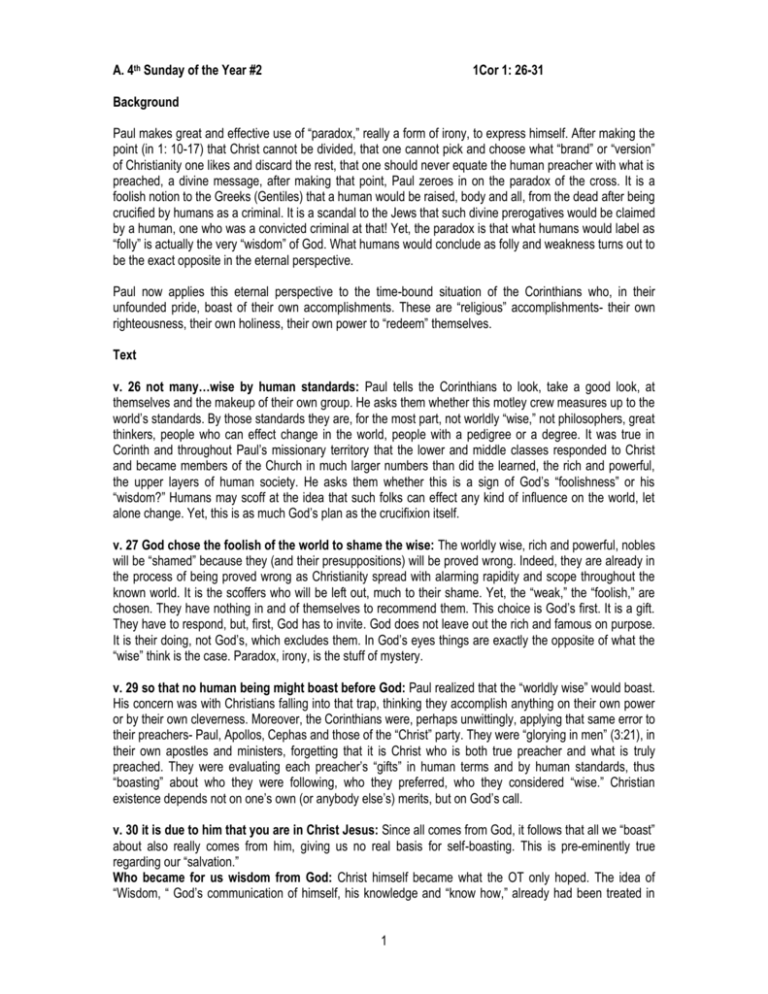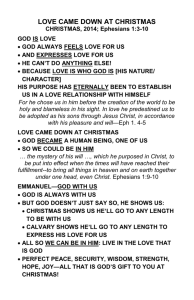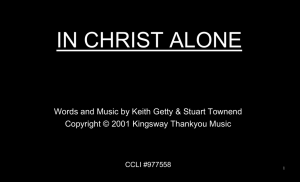A4_2
advertisement

A. 4th Sunday of the Year #2 1Cor 1: 26-31 Background Paul makes great and effective use of “paradox,” really a form of irony, to express himself. After making the point (in 1: 10-17) that Christ cannot be divided, that one cannot pick and choose what “brand” or “version” of Christianity one likes and discard the rest, that one should never equate the human preacher with what is preached, a divine message, after making that point, Paul zeroes in on the paradox of the cross. It is a foolish notion to the Greeks (Gentiles) that a human would be raised, body and all, from the dead after being crucified by humans as a criminal. It is a scandal to the Jews that such divine prerogatives would be claimed by a human, one who was a convicted criminal at that! Yet, the paradox is that what humans would label as “folly” is actually the very “wisdom” of God. What humans would conclude as folly and weakness turns out to be the exact opposite in the eternal perspective. Paul now applies this eternal perspective to the time-bound situation of the Corinthians who, in their unfounded pride, boast of their own accomplishments. These are “religious” accomplishments- their own righteousness, their own holiness, their own power to “redeem” themselves. Text v. 26 not many…wise by human standards: Paul tells the Corinthians to look, take a good look, at themselves and the makeup of their own group. He asks them whether this motley crew measures up to the world’s standards. By those standards they are, for the most part, not worldly “wise,” not philosophers, great thinkers, people who can effect change in the world, people with a pedigree or a degree. It was true in Corinth and throughout Paul’s missionary territory that the lower and middle classes responded to Christ and became members of the Church in much larger numbers than did the learned, the rich and powerful, the upper layers of human society. He asks them whether this is a sign of God’s “foolishness” or his “wisdom?” Humans may scoff at the idea that such folks can effect any kind of influence on the world, let alone change. Yet, this is as much God’s plan as the crucifixion itself. v. 27 God chose the foolish of the world to shame the wise: The worldly wise, rich and powerful, nobles will be “shamed” because they (and their presuppositions) will be proved wrong. Indeed, they are already in the process of being proved wrong as Christianity spread with alarming rapidity and scope throughout the known world. It is the scoffers who will be left out, much to their shame. Yet, the “weak,” the “foolish,” are chosen. They have nothing in and of themselves to recommend them. This choice is God’s first. It is a gift. They have to respond, but, first, God has to invite. God does not leave out the rich and famous on purpose. It is their doing, not God’s, which excludes them. In God’s eyes things are exactly the opposite of what the “wise” think is the case. Paradox, irony, is the stuff of mystery. v. 29 so that no human being might boast before God: Paul realized that the “worldly wise” would boast. His concern was with Christians falling into that trap, thinking they accomplish anything on their own power or by their own cleverness. Moreover, the Corinthians were, perhaps unwittingly, applying that same error to their preachers- Paul, Apollos, Cephas and those of the “Christ” party. They were “glorying in men” (3:21), in their own apostles and ministers, forgetting that it is Christ who is both true preacher and what is truly preached. They were evaluating each preacher’s “gifts” in human terms and by human standards, thus “boasting” about who they were following, who they preferred, who they considered “wise.” Christian existence depends not on one’s own (or anybody else’s) merits, but on God’s call. v. 30 it is due to him that you are in Christ Jesus: Since all comes from God, it follows that all we “boast” about also really comes from him, giving us no real basis for self-boasting. This is pre-eminently true regarding our “salvation.” Who became for us wisdom from God: Christ himself became what the OT only hoped. The idea of “Wisdom, “ God’s communication of himself, his knowledge and “know how,” already had been treated in 1 the OT as if it were a person (wisdom personified, is the term used). Wisdom was apprehended as God’s agent in creating, the means, the go-between, to not only create, but do so in such a way that the creation reflected, expressed, even “personified,” the Creator. Jesus, the Christ, actually was/is that agent. Simultaneously, he expresses the character of God and what is best in God’s creation. The following wordsrighteousness, sanctification, redemption- are by now typically Christian ways of capturing and expressing the meaning of “Wisdom of God.” Righteousness: Basically, and in the world, this was a forensic term, being officially declared “not guilty” by a judge. If God is the judge no one is innocent or “not guilty.” However, with Christ as the mediator, the gobetween, the agent, God can substitute “faith in him” for what the accused lacks, namely, innocence or righteousness. Since he is righteous and made things right by his atoning death, God can declare an otherwise guilty person “innocent” by virtue of that person’s being identified with the innocent Christ. Sanctification: One cannot relate to the “holy” God unless one is also “holy.” Lacking that characteristic, the unholy one identifies with Christ and becomes “holy” not in essence but by osmosis, if you will. Christ supplies for the person what that person otherwise lacks. Morally lacking that holiness, the very substitution of Christ’s holiness opens the way for a person to become morally purified. Christ is our “whatever” (whatever we lack or could never possess). Redemption: When God confers on a human being the righteousness and holiness of Christ, qualities the person both lacks and could never achieve on his/her own, he is not merely engaging in a formality, a paper transaction, a dishonest stamping “ok” on a “not-ok” person. He is not engaging in a legal fiction or technicality, much less a magical process of “abracadabra.” This declaration of innocence is real, based on a real redemption, a real paying-the-price-for, by Christ crucified for us. The “wisdom” of God would know that sham, ruse, fiction, rubber-stamping, would not do it. Christ’s suffering, death, resurrection, ascension and giving of the Spirit are all real historical events in the real world. Righteousness is not merely a forensic declaration. Sanctification (or holiness) is not merely a religious term. Redemption is not just a theological concept. These words describe realities that happened and continue to happen because of something Christ did and continues to do. And they are all examples of the paradoxical “wisdom” of God. v. 31 boast in the Lord: This is a quote from Jer 9: 24. The meaning is obvious. If we have anything we are proud of, any “claim to fame,” it is because we are “in the Lord,” not because of some power of our own. Being “in the Lord” is cause for boasting about the Lord, rather than ourselves. Anything less is false boasting. 2 Reflection God loves irony and loves paradox. He loves to communicate with us by juxtaposing our views and values against his. He quite frequently does this by contrast, by putting both realities up against each other and (in effect) saying, “Take a good look and choose which reality you will accept as true.” It is not that he makes us guess. He is not like the magician who puts out two hands, closed in fists, and says, “Pick one.” Only after we pick do we find out whether we got the prize or made a wrong choice. No, God puts out in front of us both choices and says, “Choose.” Thus, in the case of the magician, if we choose the wrong hand, we cannot really be considered to be foolish, only unlucky. However, in the case of God, we are indeed foolish if we know both options and pick the lesser one, for it is like intentionally picking the empty hand. Of course, even though God holds out both realities for our choosing, we cannot see both unless we accept God and his challenge on his terms. That means, unless we have faith, we really can’t see the other choice. The prerequisite for faith is humility, i.e. being disposed to see what God sees and how he sees it and values it. And being disposed to see requires we accept God as God. Our senses- what we can see, hear, feel and touch- are not God, though they are vehicles to God and the media through which we experience God. If we allow our senses to be God, i.e. the only determining factor in our lives, we have confused the creature (our senses) with the creator. We worship the vehicle rather than the one in the vehicle. Sometimes, indeed often, Scripture frames that fatal mistake in terms of being blind or being deaf. Here Paul frames it in terms of being foolish. A fool refuses to look past the immediate, to consider the long term consequences, to see and avoid the pitfalls and dangers, to listen to others, etc. A fool lives in the immediacy of the emotion and reacts accordingly. Secular society does not honor fools any more than religious society does. At least, not the really obvious fools. However, religious society defines foolishness differently from secular society. Indeed, to the secular mind, all religious people are fools because they are not “with it,” because they behave in ways that contradict secular values, because they live in sharp contrast to the way a secular person lives. Secular society does not merely laugh at “religious fools,” but scoffs at them. It is not the laugh of amusement, but the scorn of ridicule and contempt. “Religious fools,” fools like Christians, really annoy secularists because they provide an alternative, a contrast, to the secular way and secularists do not like or want competition from religion. Ironically and paradoxically, the secularist is not as open-minded as he/she claims to be when it comes to religion. They love the free market of ideas, until or unless those ideas are religious. So, Paul had his work cut out for him. To the secular, Greek mindset his message was foolish. To the secular mind a human being could not return from the dead and bestow his living spirit upon others. Indeed, God (or any god) would not become human, even if he could, for that would be too humiliating for God (or any god). So, that is ruled out categorically. And if that were not bad enough, even the religious mindset of his Jewish compatriots ruled out the possibility that Jesus could be their Messiah and God’s Son because he was put to death as a criminal and that would be too humiliating for God. Despite these two “wise” positions, apparently, God has no problem with the cross. This is yet another indication of how wrong human standards of evaluating truth are or can be. What to the human mind is either a scandal or downright foolish is “business as usual” with God. The cross teaches us how different we are from God and how distant we are or were. Embracing the cross means embracing much more than a scandal, an anomaly, a contradiction, a paradox. It means embracing a point of view entirely foreign to the human mentality, no matter how smart, learned or wise. It is a part of God’s unique sense of humor (his folly?) that he would choose such an ugly thing as a crucifixion to reveal his beauty, such a hateful thing to reveal his love and such a violent thing to reveal his peace. To keep us from boasting, from being puffed up, enamored with ourselves, our intelligence and our expertise, God saw to it that we glory, boast, in the cross. What a thing to glory in! Of course, many will not take us seriously. Paradoxically and ironically, that prevents us from taking ourselves too seriously, or our accomplishments. The only thing we can boast in and about is Christ, his cross, his folly, God’s wisdom. 3 Key Notions 1. No matter what a person’s qualifications or qualities might be in the eyes of the world, everyone is “eligible” to be a Christian. 2. Belonging to Christ or “being in Christ Jesus” causes the qualifications and qualities of Christ to be in the Christian. 3. To behave like Christ or, rather, to allow Christ to behave through the Christian, requires a conscious decision before every act. 4. The Christian consults Christ before acting, acts by his power, and has no cause for personal boasting. 5. When the opportunity presents itself the Christian gives Christ the credit for his/her behavior. Food For Thought 1. Irony and Paradox: Webster’s dictionary defines irony as “an outcome of events contrary to what was, or might have been, expected.” It is either “a contradiction between an action or expression and the context in which it occurs” or it reveals the incongruity between the expected and the actual. The irony of a situation or outcome is far from obvious to everyone. It is almost always subtle and requires thoughtful penetration into the facts and goes beyond the facts to their meaning in a wider context than the immediate present. Scripture, and therefore God, uses irony quite a bit to reveal the way God sees things and interprets them. “Paradox” is a cousin to irony (as is “sarcasm,” though sarcasm is the nasty cousin). Webster defines paradox as “a seemingly contradictory or absurd statement that expresses a possible truth” and “an opinion or statement contrary to commonly accepted opinion.” Scripture is full of paradoxical statements and this text is a good example. Of course, every paradoxical statement is not automatically true. Note “seemingly” and “possible truth” in the dictionary definition. And there’s even irony in that, for people can miss the truth right under their noses if they are not thoughtful. Being thoughtful means giving things another look-see, a second notice. Interestingly, that’s also the meaning of “repent” as Jesus uses the term. Looking twice, looking beyond, looking into are three different ways of saying the same thing: having or getting a second opinion. For Christians, that second opinion is God’s opinion. We find that in Scripture. Yet, even that is not automatic or guaranteed. We need God’s Spirit to interpret Scripture, lest we impose our preconceived notions upon it. With God’s Spirit, given at Baptism, but constantly asked for nonetheless, we can read Scripture, not read into it what we would like, but read out of it what God likes, and discover the truth hidden within earthbound reality. The primary, indeed essential, example of irony and paradox is the cross. Earthlings, who know nothing of an alternative reality, will look at the cross and see failure, interpret the reality on the earthly level. Kingdom of God members will look at the same cross, the same facts, and see something opposite, victory. Christians are very much at home in the world (field of interpretation) of irony and paradox. They are the intersections between levels of reality. They are really the cross or crossroads, the intersection or interstices, where decisions are made. Which way will I go? The way of the cross as failure or as victory? When we accept the cross, we glory in it, i.e. we find the light we need to interpret everything else as God does, for the cross is the way God is present and the proof of his boundless love for us. It teaches us how to find God in the midst and mist of the most unlikely places and at the most unexpected times, “contrary to what was, or might have been, expected.” 2. Christians: Christians themselves are paradoxes. As Paul remarks, Christians do not need to be earthly-smart to be wise, earthly-strong to be powerful, manor-born to be noble. Christians are such because they are chosen, not accomplished. Christians, by their practice of virtue despite the circumstances or cost, turn the world upside down, confound the worldly-wise, and reveal the tenuous basis for earthbound wisdom. That earthbound wisdom is based on “commonly accepted opinion,” whereas Christian wisdom is based on God’s revealed truth. 4









